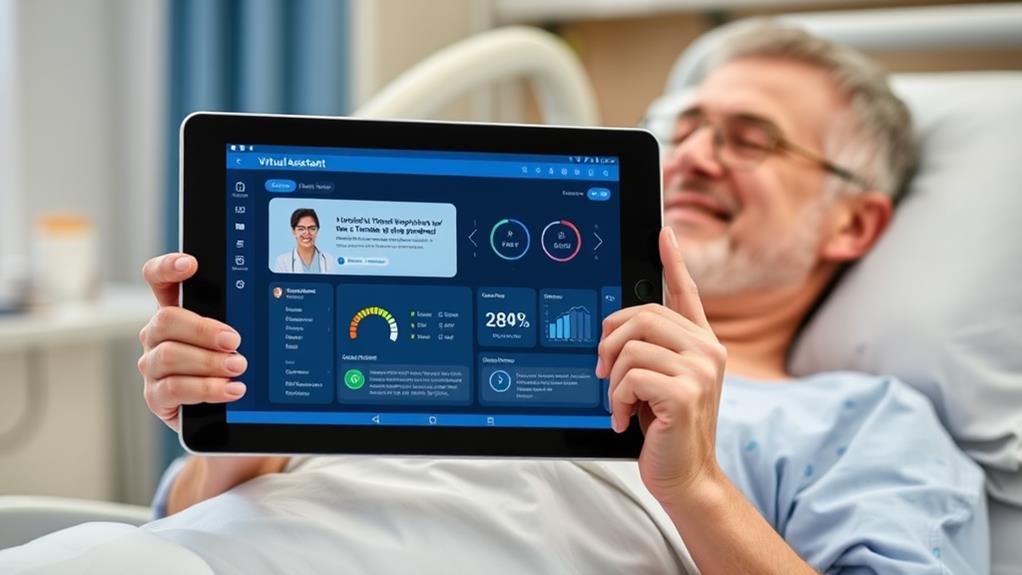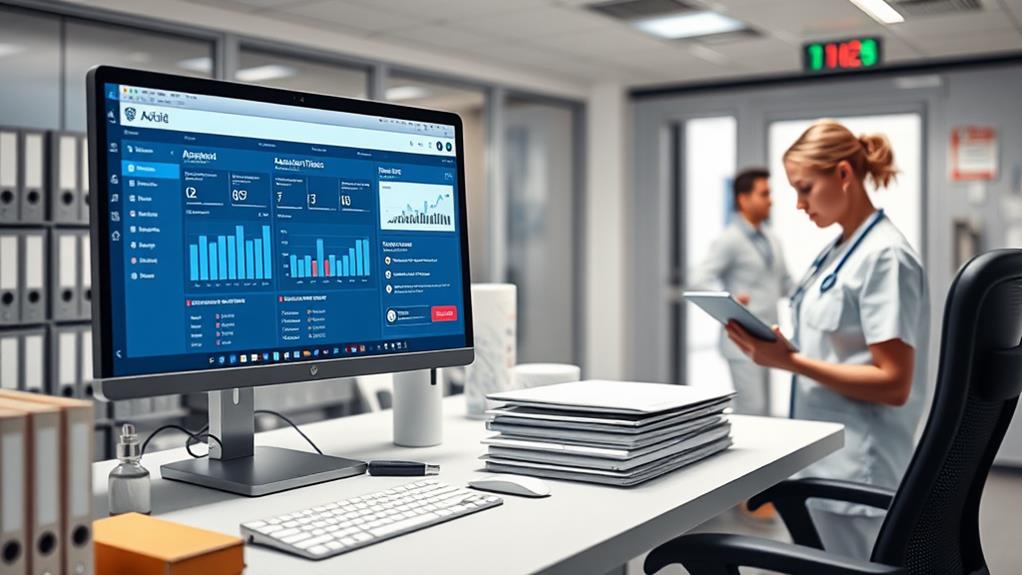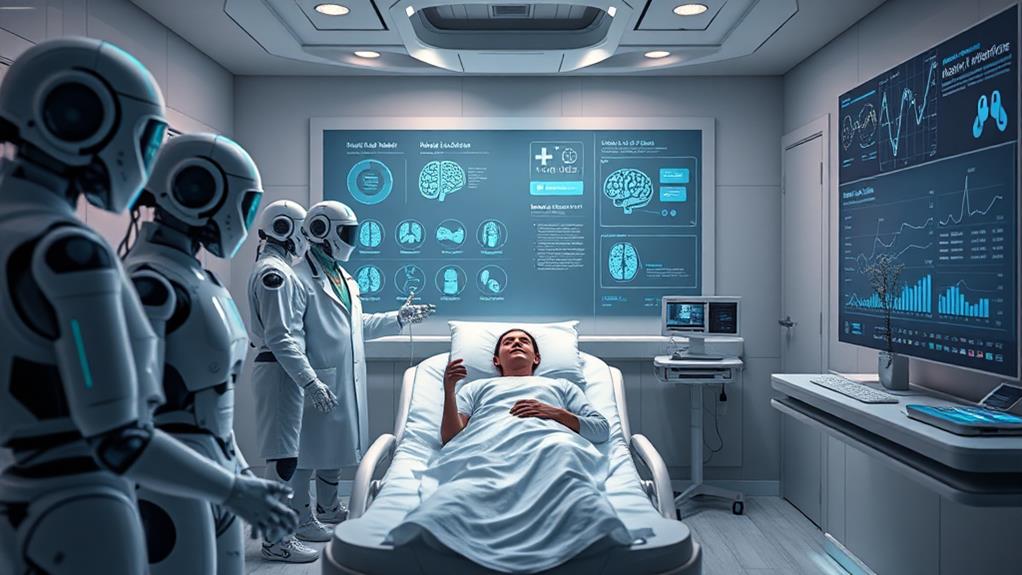A 'new chapter' is unfolding in healthcare, and you're likely to notice the difference. With AI-powered tools analyzing medical images, detecting diseases, and identifying high-risk patients, the accuracy and speed of diagnosis are improving substantially. You might be wondering how AI's involvement in healthcare is impacting your own care. As AI continues to transform the industry, you'll want to understand its far-reaching implications – from enhanced patient engagement to streamlined administrative tasks. But what does this mean for the future of healthcare, and how will you benefit from these advancements?
Key Takeaways
- AI-powered tools analyze medical images to identify abnormalities with high precision, enabling accurate disease diagnosis.
- Machine learning algorithms teach machines to learn from data, improving performance over time and enabling accurate diagnosis.
- AI-driven diagnostic tools analyze large datasets to provide accurate diagnosis, with up to 45% improvement in diagnosis accuracy.
- AI-powered chatbots and virtual assistants facilitate remote monitoring, communication, and patient engagement, leading to better health outcomes.
- AI-driven technologies provide clinicians with data-driven insights to inform personalized treatment decisions and develop effective treatment plans.
Improving Disease Detection
In the quest to improve disease detection, AI-powered tools and algorithms have emerged as game-changers, enabling clinicians to identify patterns in large datasets with unprecedented accuracy.
You can now harness the power of AI to analyze medical images like X-rays and MRIs to identify abnormalities and diagnose diseases like tuberculosis and lung cancer with high precision. AI-assisted computer vision can detect diseases with higher accuracy and speed, such as detecting breast cancer from mammography images with a 97% accuracy rate, outperforming human clinicians.
This is made possible by machine learning, Machine Learning, which teaches machines to learn from data and improve their performance over time. Additionally, AI's ability to analyze electronic health records and identify high-risk patients is also influenced by its subset, Natural Language Processing, allowing computers to understand and interpret human language.
Machine learning algorithms can analyze electronic health records (EHRs) and identify high-risk patients for chronic diseases like diabetes and cardiovascular disease, enabling early interventions and preventive measures.
AI-driven diagnostic tools can analyze large datasets to provide accurate diagnosis, with some clinical trials showing up to 45% improvement in diagnosis accuracy. By leveraging AI-powered diagnostic tools and machine learning algorithms, you can improve disease detection, enabling clinicians to provide more effective treatment plans and improving patient outcomes.
This synergy between AI and clinicians holds great promise for revolutionizing disease detection and transforming healthcare.
Enhancing Patient Engagement

As AI-powered diagnostic tools continue to improve disease detection, you can now leverage AI's capabilities to extend beyond the clinical sphere and directly engage patients in their care.
AI-powered tools can send patients personalized alerts, content, and advice to improve adherence to treatment plans, leading to better health outcomes and reduced healthcare costs.
Wearables and personalized medical devices can also help patients and clinicians monitor health, contributing to research on population health factors by collecting and analyzing data.
Implementing AI chatbots can increase customer satisfaction by up to 24% through instant responses and resolutions to customer inquiries, and this concept can also be applied to patient engagement, where AI-driven chatbots can help patients access medical information, schedule appointments, and receive personalized health advice.
AI-powered chatbots can also handle up to 80% of routine customer inquiries, freeing up human staff to focus on complex issues and higher-value tasks, which can be applied to healthcare by freeing up medical staff to focus on more critical tasks.
AI-driven virtual assistants can facilitate remote monitoring and communication, reducing hospital readmissions by 15% and improving patient outcomes.
Personalized AI-generated patient portals can provide patients with tailored health information, leading to a 30% increase in patient activation and empowerment.
AI-powered chatbots can help patients access medical information, schedule appointments, and receive personalized health advice, leading to a 24% increase in patient engagement.
Revolutionizing Treatment Plans
You're now on the cusp of witnessing a healthcare revolution, one where AI-driven technologies are transforming the way treatment plans are developed and implemented.
Artificial intelligence is revolutionizing treatment plans by providing clinicians with data-driven insights to inform personalized treatment decisions. Clinical decision support systems, powered by machine learning algorithms, analyze large datasets to identify the most effective treatment options for individual patients.
In addition, AI-driven chatbots are enhancing patient care by offering round-the-clock support and personalized product recommendations, leading to improved patient outcomes.
Additionally, AI technology is advancing immunotherapy by determining new targeting therapies for individual genetic makeup, leading to improved patient outcomes.
AI-powered health assistants can also send patients alerts or content to provoke action and improve adherence to treatment plans, resulting in better health outcomes and reduced readmission rates.
Besides, AI-powered systems can analyze medical records, genetic data, and medical literature to provide personalized treatment plans tailored to individual patients.
Streamlining Administrative Tasks

Streamlining administrative tasks is a critical step in revolutionizing healthcare, and AI is leading the charge.
By automating administrative tasks, healthcare organizations can reduce operational costs by up to 20%, which can be reinvested in patient care and quality improvement initiatives.
AI-powered administrative tools can automate tasks such as claims processing, medical billing, and electronic health records management, freeing up to 30% of clinicians' time for patient care.
Effective chatbot development, Chatbot Analytics, can also help streamline administrative tasks by analyzing conversational flow and sentiment analysis.
Additionally, integrating chatbots with CRM systems can help gather valuable insights into customer preferences and behaviors.
AI-driven chatbots can help streamline patient registration, scheduling, and data collection, reducing wait times and improving the overall patient experience.
Additionally, AI-powered virtual assistants can assist with tasks such as prior authorizations, referrals, and prescription refills, allowing healthcare professionals to focus on higher-value tasks.
Transforming Healthcare Outcomes
The advent of AI in healthcare is revolutionizing patient outcomes by transforming the way clinicians diagnose and treat diseases.
By leveraging artificial intelligence (AI) and machine learning (ML) algorithms, healthcare providers can analyze complex medical data and draw conclusions without direct human input. This enables clinicians to make more accurate diagnoses and develop effective treatment plans, ultimately leading to improved patient outcomes.
AI tools can also analyze user behavior, creating unique experiences for each patient and optimizing their treatment plans accordingly, much like AI analytics tools study user behavior to create unique experiences for each visitor.
Additionally, AI-powered predictive analytics can help healthcare providers plan their strategies and offer timely and relevant treatments.
- Enhanced diagnostics: AI-powered tools can analyze medical images with high precision, identifying small abnormalities and early-stage biomarkers. This enables clinicians to detect diseases at an early stage, improving treatment outcomes and reducing costs.
- Personalized medicine: AI can analyze large datasets to provide clear risk stratification and enable early intervention. This allows clinicians to develop personalized treatment plans tailored to individual patient needs.
- Real-time insights: AI-driven decision support systems can provide clinicians with valuable clinical data at the time of diagnosis, leading to more accurate and timely treatment plans.
Frequently Asked Questions
How AI Will Revolutionize Healthcare?
You'll witness AI transforming healthcare by enhancing disease detection, diagnosis, and treatment. AI-powered tools will analyze complex data, identify patterns, and provide precise insights, leading to improved patient outcomes, reduced costs, and enhanced care quality.
How Can Artificial Intelligence Change Healthcare?
You can harness AI to transform healthcare by applying machine learning algorithms to diagnose diseases, personalize treatments, and streamline clinical workflows, leading to improved patient outcomes, reduced costs, and enhanced clinician satisfaction and productivity.
How Is Machine Learning Revolutionizing Healthcare?
You see machine learning revolutionizing healthcare by enhancing diagnostics through pattern recognition in medical data, improving treatment accuracy, and predicting patient outcomes, ultimately transforming the way you approach disease detection and patient care.
How Is AI Being Used in Healthcare Today?
You analyze AI's impact in healthcare today, where 97% accuracy rates are achieved by AI-driven diagnostic tools, and AI-powered algorithms analyze medical images, identifying small abnormalities and early-stage biomarkers, guiding clinicians in decision-making.
Conclusion
You've seen how AI is revolutionizing healthcare. With AI-powered tools, disease detection accuracy has increased substantially. In fact, studies have shown that AI can detect breast cancer from mammography images with a 97% accuracy rate, outperforming human radiologists. As AI continues to improve healthcare outcomes, you can expect better patient engagement, more effective treatment plans, and streamlined administrative tasks. The future of healthcare is unquestionably AI-driven, and the results are already impressive.

